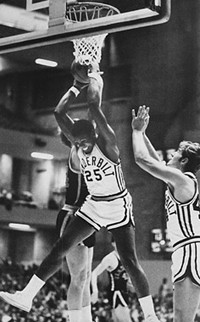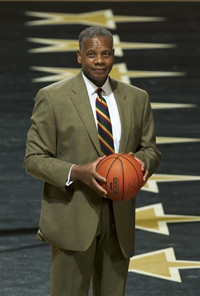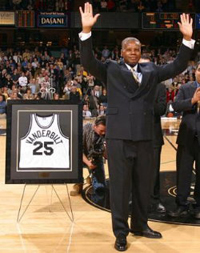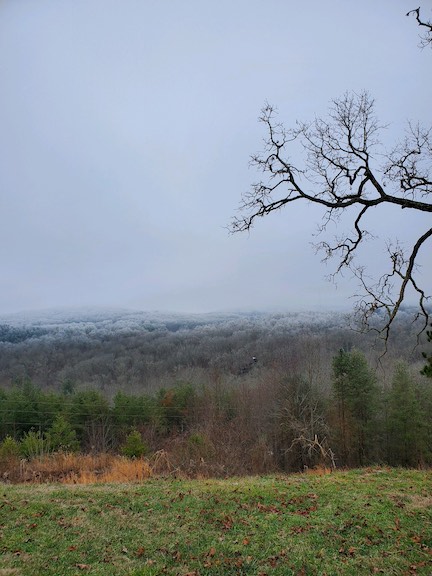Plantation Drive-By
Once I figured out what a sordid and confused battle my attackers were waging, I was no longer afraid
“You’re not going to get this all the time! All this attention! You know that! Don’t you?”
The words struck abruptly and then lingered in the air. The angry face that framed two appropriately menacing eyes belonged to one of the other winners at an award ceremony. We were all being honored for achievement, character, and public service. Character, I wanted to remind my fellow awardee. I had won in part because of my contributions as the first black varsity basketball player in the Southeastern Conference. But in addition to the award that night, I had also been the focus of other prominent tributes, along with considerable publicity. Apparently all this acclaim was way too much for my fellow awardee. Apparently it was way too much for me.
 The good news: at the other celebrations where I had been honored—at the 2003 Tennessee Sports Hall of Fame ceremony and the 2008 Vanderbilt University Athletics Hall of Fame ceremony, for example—the tenor had been grand, and people were gracious. This was an isolated encounter, an outlier, the relic, I believed, of a time whose less-savory features recede daily.
The good news: at the other celebrations where I had been honored—at the 2003 Tennessee Sports Hall of Fame ceremony and the 2008 Vanderbilt University Athletics Hall of Fame ceremony, for example—the tenor had been grand, and people were gracious. This was an isolated encounter, an outlier, the relic, I believed, of a time whose less-savory features recede daily.
If this is true, you may be wondering, then why would I bother to write about the encounter? The answer, honestly, is that it was so striking, so confrontational (in a one-sided way, of course), it has continued to intrigue me. It did not achieve its intended effect: no harsh sentiments, no recriminations here. But the sheer impact and intensity of the moment evoked certain questions. What motive or need would elicit such sentiments, especially at a celebration honoring the speaker’s own achievements and contributions? Was this eruption about simple envy, even from such an accomplished person? What sense of authority or privilege would embolden a person to walk up to a virtual stranger and act in such a manner?
Reluctantly, I have concluded that something more than routine envy or rudeness was at play. Indeed, in the face, in the voice, I perceived something that loomed transcendently larger than everyday human pettiness. It was an attitude whose spirit is that of an old enemy, an antagonist I hadn’t encountered so directly in quite a few years.
It was a plantation drive-by.
In the Old South, as during my own youth, some whites were known to use threats and intimidation to keep blacks “in their place.” And, ironically, even some blacks, overwhelmed by these assaults themselves, became in effect “agents” of that same message. And in a Kafkaesque partnership, hatred with self-hatred, some whites and some blacks came to manifest amazingly similar destructive behavior. Words like those I heard at the awards ceremony were often put to me when I was a young man:
“You’re nothing! Remember that!”
“Don’t get too big, boy!”
“Watch yourself, boy!”
 If you’re wondering whether these exhortations were a form of tough love, ham-handed admonitions born out of sincere concern for my safe passage as a pioneer, don’t fool yourself. Not those faces. Not those eyes. Not those voices. Not those slow, determined footsteps. In elevators, in hallways, walking across campus, in corners at social events, in churches, and by the hundreds at sports events, the words found their target. Whether uttered loudly or secretively, they carried an unforgettable tone of threat and denunciation. Their purpose was to attack, to intimidate, to instill the kind of fear and humiliation that would keep me trapped.
If you’re wondering whether these exhortations were a form of tough love, ham-handed admonitions born out of sincere concern for my safe passage as a pioneer, don’t fool yourself. Not those faces. Not those eyes. Not those voices. Not those slow, determined footsteps. In elevators, in hallways, walking across campus, in corners at social events, in churches, and by the hundreds at sports events, the words found their target. Whether uttered loudly or secretively, they carried an unforgettable tone of threat and denunciation. Their purpose was to attack, to intimidate, to instill the kind of fear and humiliation that would keep me trapped.
A drive-by attack—literally the sudden shooting by an assailant riding in a passing automobile—carries a distinctive and tragic connotation today. And while it is generally associated with ghetto youth, the drive-by is in reality a culturally-adapted expression of a universal act. Any time people seek, in one stroke and suddenly, to attack, to destroy, to disable, it’s a drive-by. However incongruous the term appears to be in relation to the person and the moment I’m describing, it is sadly apt. Indeed, coming from humble Nashville origins, I have been amazed to observe over the years, in myriad settings—villages in Africa and South America, elite social and professional settings in Washington, New York, London and Paris—that anyone can be a thug or a bully. Anyone can commit a drive-by.
As a young man, once I had mustered the strength to endure and resist such aggression, I began to study my antagonists very, very closely. From that perch, that front row seat, I took copious mental notes on the nature and characteristics of some of the saddest forms of human behavior. And what I learned from the “clinic” they conducted for me was astounding. What I discovered actually helped to protect me, once it became clear what these people were doing to themselves while trying to harm me. Curious notion isn’t it, that vicious personal attacks could provide raw material for the development of personal strength? What I learned in those clinics is that people who seem scary, intimidating, superhuman, are in fact sad and weak.
Imagine that someone from a major television news channel had stepped in at one of these moments and captured my attacker’s statements on camera, and then—with camera and microphone in place—posed the following questions: “Can you explain how your words are consistent with being a good American? A good Christian? What do they say about you? Have you just compromised any of your own highly-held values?” Now imagine the reaction of the interviewee.
Obviously, this imagery is awkward and contrived, but it is also revealing. And, similarly, those clinics became amazingly informative for me. What I began to see was that my antagonists had disrobed. They had shown me something bare and essential about themselves, about their character and values. And it wasn’t pretty. But I was no longer afraid. I began to see how much these people couldn’t see about me.
 Just think about it. They were attacking someone whose main billing was that he had successfully resisted all kinds of attempts to discourage, defeat, and demoralize him. What could they have been thinking?
Just think about it. They were attacking someone whose main billing was that he had successfully resisted all kinds of attempts to discourage, defeat, and demoralize him. What could they have been thinking?
Here’s my answer: They weren’t thinking. That’s what happens when people allow themselves to be consumed with envy, ignorance, hatred, self-hatred, and other sorry states of mind and heart. In effect, they had created an image of me in their minds—a distorted image that was never me. Attacking that image appeared to give them some sick sense of satisfaction. I found a certain sort of protection—and admittedly a wry sense of justice—in the fact that my attacker was so fundamentally blind, crude, and thoughtless. Once I figured out what a sordid and confused a battle they were waging, a battle more against an image they had created than against me, I was no longer afraid.
People can be incredulous, at times even critical, when I tell them that I always treated these bad actors with civility. They assume I was weak, naïve, or simply “just too nice.” The reality is that I always had a specific plan of action, and it was based on a tough-minded assessment of the circumstances, as well as a respect for certain important values.
As a practical matter, I learned that the bullying could escalate if I reacted rashly or precipitously. Those who bully have put themselves in an emotional space that often makes them volatile and dangerous. If you can shut them down—totally and finally—by taking direct action, then by all means do just that. But if you can’t, the problem could become amplified. Many people who give advice on this subject are clearly not experts. They know that one should fight bullying, but they have no real sense of how to fight. People actually used to urge me to go into the stands at basketball games in the Deep South and accost the racist cat-callers.
But it’s also important to remember, even when insults are being hissed during an award ceremony, that there are principles to preserve, an image or a reputation to maintain. As a pioneer, these considerations were always present in my mind during threatening encounters. Fortunately, my decisions to combine enlightenment and restraint worked out just fine—for me and for the progress in America that I was pursuing.
Copyright (c) 2012 by Perry E. Wallace. All rights reserved. Perry Wallace is a professor of law at the American University Washington College of Law in Washington, D.C. He is a graduate of Vanderbilt University and the Columbia Law School. Wallace made history at Vanderbilt in the 1960s as the first African-American varsity basketball player in the Southeastern Conference. Among his many honors are induction into the Tennessee Sports Hall of Fame (2003) and the Vanderbilt University Athletics Hall of Fame (2008).

